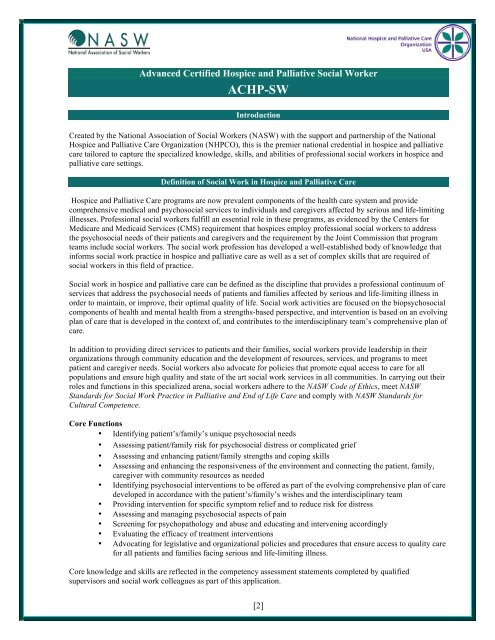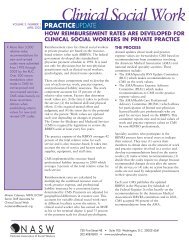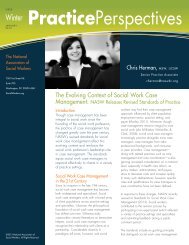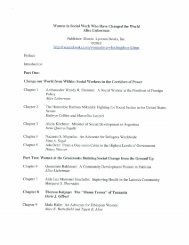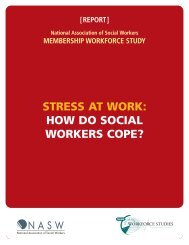ACHP-SW - National Association of Social Workers
ACHP-SW - National Association of Social Workers
ACHP-SW - National Association of Social Workers
- No tags were found...
You also want an ePaper? Increase the reach of your titles
YUMPU automatically turns print PDFs into web optimized ePapers that Google loves.
Advanced Certified Hospice and Palliative <strong>Social</strong> Worker<strong>ACHP</strong>-<strong>SW</strong>IntroductionCreated by the <strong>National</strong> <strong>Association</strong> <strong>of</strong> <strong>Social</strong> <strong>Workers</strong> (NA<strong>SW</strong>) with the support and partnership <strong>of</strong> the <strong>National</strong>Hospice and Palliative Care Organization (NHPCO), this is the premier national credential in hospice and palliativecare tailored to capture the specialized knowledge, skills, and abilities <strong>of</strong> pr<strong>of</strong>essional social workers in hospice andpalliative care settings.Definition <strong>of</strong> <strong>Social</strong> Work in Hospice and Palliative CareHospice and Palliative Care programs are now prevalent components <strong>of</strong> the health care system and providecomprehensive medical and psychosocial services to individuals and caregivers affected by serious and life-limitingillnesses. Pr<strong>of</strong>essional social workers fulfill an essential role in these programs, as evidenced by the Centers forMedicare and Medicaid Services (CMS) requirement that hospices employ pr<strong>of</strong>essional social workers to addressthe psychosocial needs <strong>of</strong> their patients and caregivers and the requirement by the Joint Commission that programteams include social workers. The social work pr<strong>of</strong>ession has developed a well-established body <strong>of</strong> knowledge thatinforms social work practice in hospice and palliative care as well as a set <strong>of</strong> complex skills that are required <strong>of</strong>social workers in this field <strong>of</strong> practice.<strong>Social</strong> work in hospice and palliative care can be defined as the discipline that provides a pr<strong>of</strong>essional continuum <strong>of</strong>services that address the psychosocial needs <strong>of</strong> patients and families affected by serious and life-limiting illness inorder to maintain, or improve, their optimal quality <strong>of</strong> life. <strong>Social</strong> work activities are focused on the biopsychosocialcomponents <strong>of</strong> health and mental health from a strengths-based perspective, and intervention is based on an evolvingplan <strong>of</strong> care that is developed in the context <strong>of</strong>, and contributes to the interdisciplinary team’s comprehensive plan <strong>of</strong>care.In addition to providing direct services to patients and their families, social workers provide leadership in theirorganizations through community education and the development <strong>of</strong> resources, services, and programs to meetpatient and caregiver needs. <strong>Social</strong> workers also advocate for policies that promote equal access to care for allpopulations and ensure high quality and state <strong>of</strong> the art social work services in all communities. In carrying out theirroles and functions in this specialized arena, social workers adhere to the NA<strong>SW</strong> Code <strong>of</strong> Ethics, meet NA<strong>SW</strong>Standards for <strong>Social</strong> Work Practice in Palliative and End <strong>of</strong> Life Care and comply with NA<strong>SW</strong> Standards forCultural Competence.Core Functions• Identifying patient’s/family’s unique psychosocial needs• Assessing patient/family risk for psychosocial distress or complicated grief• Assessing and enhancing patient/family strengths and coping skills• Assessing and enhancing the responsiveness <strong>of</strong> the environment and connecting the patient, family,caregiver with community resources as needed• Identifying psychosocial interventions to be <strong>of</strong>fered as part <strong>of</strong> the evolving comprehensive plan <strong>of</strong> caredeveloped in accordance with the patient’s/family’s wishes and the interdisciplinary team• Providing intervention for specific symptom relief and to reduce risk for distress• Assessing and managing psychosocial aspects <strong>of</strong> pain• Screening for psychopathology and abuse and educating and intervening accordingly• Evaluating the efficacy <strong>of</strong> treatment interventions• Advocating for legislative and organizational policies and procedures that ensure access to quality carefor all patients and families facing serious and life-limiting illness.Core knowledge and skills are reflected in the competency assessment statements completed by qualifiedsupervisors and social work colleagues as part <strong>of</strong> this application.[2]


